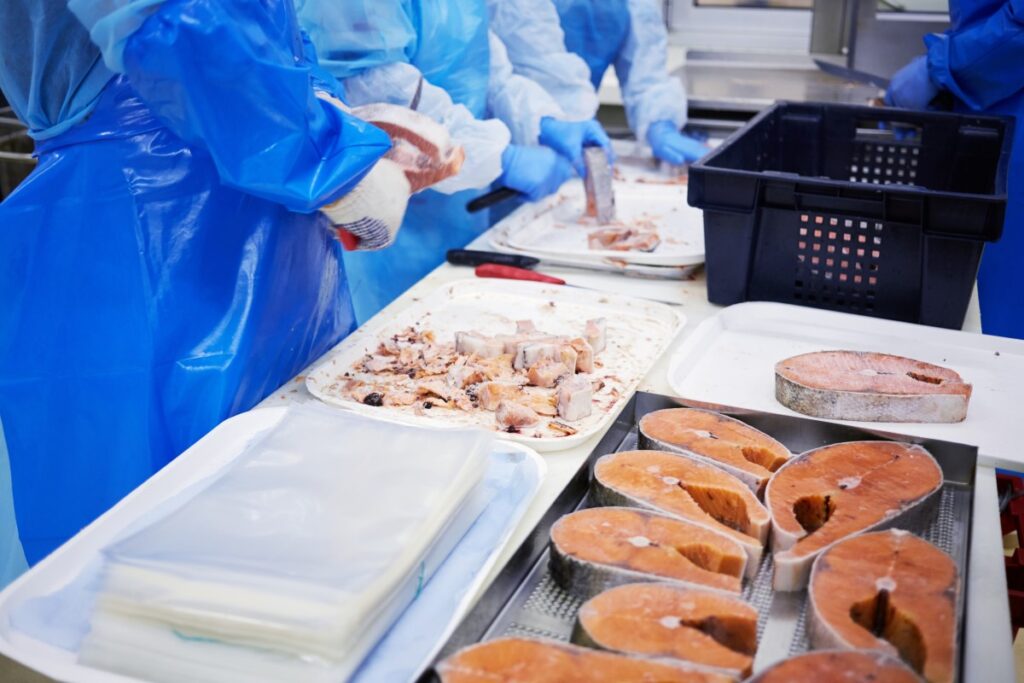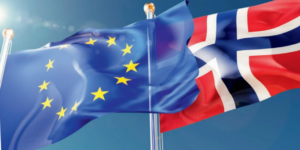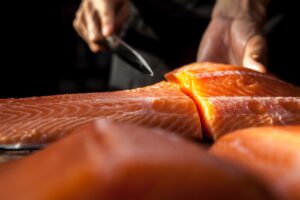Can you fillet?

Norway’s ban on the export of ‘inferior’ quality salmon is being challenged by the countries who want to process it, reports Vince McDonagh
Is Norway heading for a potentially damaging dispute with the European Union (EU) over the sale of production fish?
Commonly known as prodfish, this term is mainly given to salmon that have been damaged by injuries or winter sores.
The Norwegian Food Safety Authority insists that these wounds must be corrected before the fish is exported. It is already investigating a number of companies who it believes are regularly breaking the rules. There have even been calls for the police to become involved.
This rule not only protects Norway’s reputation as an exporter of quality seafood (its ostensible purpose), but it also ensures that more processing is carried out at home rather than in countries such as Poland and Denmark, which are both members of the EU, of course.
Norway divides its salmon into three grades – superior, ordinary and production, the latter being up to 30% cheaper, although once wounds have been removed, the quality of the fillets can be quite good.
Processors outside Norway say an unfair market is being created because they do not have access to this cheaper fish.
The European Commission has officially said the practice is a trade barrier, without going much further on what that could mean for relations.

European Union and Norwegian flags
A simmering argument
The issue has been knocking around for a while, but in the past couple of years the volume of prodfish has increased, with the Food Safety Authority suggesting the figure is around 37%. The proportion of total sales accounted for by prodfish is especially high in winter, when sores are a problem.
The ban has set alarm bells ringing in Brussels so if the European Commission and the Norwegian authorities dig their heels in over this, it could well lead to a trade impasse.
It is thought that Denmark, probably the second-largest processor of Norwegian salmon, was the first country to raise a complaint, probably because its processing industry has much to lose.
But Dutch fishermen and fishing organisations, which also represent buyers and wholesalers, have also called for an investigation into the restrictions.
“We await the upcoming process but share the enthusiasm of our Danish colleagues that the entire EU now sees Norway’s export ban on farmed salmon as a trade barrier,” says the Dutch Fishing Federation.
The Norwegian industry itself remains divided over the issue with Mowi, Norway’s largest salmon company, calling for an exemption on the grounds there is not enough processing capacity at home.
Inge Erlend Næsset, Department Director for Regulations and Control at the Norwegian Food Safety Authority, insists: “Production fish are farmed fish with wounds, deformities and gross processing errors. Such fish must not be sold for human consumption until it has been treated by a domestic business with the necessary equipment. When transporting production fish, the packaging must be clearly marked ‘only for domestic production’.
“This national requirement is to ensure good quality of fish and fish products for the consumer, and contribute to ensuring that Norwegian fish can be sold on markets all over the world.”
He adds: “The fact that some people choose to break the regulations also creates different competitive conditions for the business players.”
This has led to complaints that some companies will be able to break the rules while others stick to them.
The European Commission ruling has officially registered the Norwegian approach as “unfair competition” so the wheels are in motion for a protracted dispute.
No-one wants an escalation, not least the Norwegian seafood industry, which classes Europe as its most important market. But the potential is there for this to go further.
The issue will be raised at bilateral meetings this year between Norway and the European Commission, but unless one side backs down it is difficult to see a quick resolution.
Much will depend on how far the European Commission will go to ensure its rules are kept, but it is not an organisation known for compromise with smaller nations.

Brussels vs Oslo?
Although it has yet to capture public attention, the issue is now beginning to create headlines in Norway, where attitudes to Europe can be as divided as they are in Britain.
The national employer organisation, Seafood Companies (Sjomatbedriftene), is urging the Norwegian authorities to reject Mowi’s call for an exemption. Its CEO, Robert H Eriksson, has said the issue is not about protectionism, but the reputation of Norwegian salmon in the market.
He added: “What we are witnessing now is that more fish of poor quality end up on the market. When you consider this in the context of the challenges and negative publicity that have circulated in the media over the past six months, it does not contribute to building increased trust in our industry, neither here at home nor abroad.”
Seafood Companies argues that the exemption “will make it easier to turn a blind eye to the regulations.” Consequently, Eriksson expects that the department is aware of this and does not facilitate the “cheating to take place.”
It is going to be months, possibly longer, before the dispute is sorted out, but at the moment Norwegian authorities and the European Commission are like two dogs fighting over a bone. One will almost certainly have to bend but with Norway clearly having more to lose.

